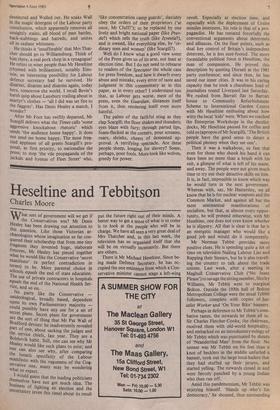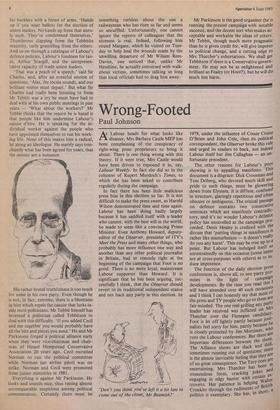Heseltine and Tebbitson
Charles Moore
/What sort of government will we get if the Conservatives win? Mr Denis Healey has been drawing out attention to this question. Like those Victorian ar- chaeologists whose imagination so far con- quered their scholarship that from one tiny fragment they invented huge, elaborate frescoes, Mr Healey has pieced together what he would like the Conservative 'secret manifesto' (a perfect contradiction in terms) to be. More parental choice in schools equals the end of state education. The use of private contractors in hospitals equals the end of the National Health Ser- vice, and so on. the Conservatives win? Mr Denis Healey has been drawing out attention to this question. Like those Victorian ar- chaeologists whose imagination so far con- quered their scholarship that from one tiny fragment they invented huge, elaborate frescoes, Mr Healey has pieced together what he would like the Conservative 'secret manifesto' (a perfect contradiction in terms) to be. More parental choice in schools equals the end of state education. The use of private contractors in hospitals equals the end of the National Health Ser- vice, and so on.
No party like the Conservative unideological, broadly based, dependent upon its own Parliamentary majority could possibly have any use for a set of secret plans. Secret plans for government are the sort of thing that Mr Pat Wall of Bradford devises: he inadvertently revealed part of one, about sacking the judges and the service chiefs, last year. They are a Bolshevik habit. Still, one can see why Mr Healey would like such plans to exist; and one can also see why, after comparing the lunatic specificity of the Labour manifesto with the vagueness of the Coo- servative one, many may be wondering what to expect. I would guess that the leading politicians themselves have not got much idea. The business of fighting an election and the uncertainty (even this time) about its result put the future right out of their minds. A better way to get a sense of what is to come is to look at the people who will be in charge. We have all seen a very great deal of Mrs Thatcher and, in this last week, the television has so organised itself that she will be on virtually incessantly. But there are others.
There is Mr Michael Heseltine. Since be- ing made Defence Secretary, he has oc- cupied the one eminence from which a Con- servative minister cannot stage a left-wing revolt. Especially at election time, and especially with the deployment of Cruise missiles imminent, his role is that of a pro- pagandist. He has restated forcefully the conventional arguments about deterrents and alliances. On the finer points, such as dual key control of Britain's independent deterrent, he is less sure-footed. The more formidable political force is Heseltine, the man of compassion. He proved this description by quoting Disraeli at the 1981 party conference; and since then, he has saved our inner cities. It was in his caring capacity that he took a charabanc load of journalists round Liverpool last Saturday. We rushed from Barratt flat to Barratt house to Community Refurbishment Scheme to International Garden Centre with Mr Heseltine enthusing about how witty the local 'kids' were. When we reached the Enterprise Workshops in the derelict docks, Mr Heseltine paused for coffee and told us (apropos of Mr Scargill), 'The British people have the good sense to detect a political phoney when they see one'.
Then it was a walkabout, so fast that even for those who shook his hand it can have been no more than a brush with his suit, a glimpse of what is left of his mane, and away. The people were not given much time to try out their detective skills on him.
It is, in fact, impossible to know which way he would turn in the next government.
Whereas with, say, Mr Hattersley, we all know that he is for nuclear weapons and the Common Market, and against all but the most sentimental manifestations of socialism, but that, at almost every oppor- tunity, he will pretend otherwise, with Mr
Heseltine, one does not even know whether
he is slippery. All that is clear is that he is an energetic manager who would like a good job and would do it competently. Mr Norman Tebbit provides more positive clues. He is spending quite a lot of time on television Nailing Labour Lies and Rapping their Smears, but he is also travell- ing the country to talk about the trade unions. Last week, after a meeting in Maghull Conservative Club (`No Jeans
Please') to savage the sitting member, Shirley Williams, Mr Tebbit went to marginal Bolton. Outside the 1930s hall of Bolton Metropolitan College were the usual Tebbit followers, complete with copies of Soc- ialist Worker and 'On Your Bike' banners. Perhaps in deference to Mr Tebbit's com- bative tastes, the stewards let them all in. Sir Charles Fletcher-Cooke, the chairman,
received them with old-world hospitality, and embarked on an introductory eulogy of Mr Tebbit which was punctuated by shouts of 'Neanderthal Man' from the floor. No sooner was Mr Tebbit on his feet than a knot of hecklers in the middle unfurled a banner, took out the large loud-hailers that they had stuffed up their jerseys, and started yelling. The stewards closed in and were fiercely punched by a young Indian who then ran off.
Amid this pandemonium, Mr Tebbit was enjoying himself. 'Hands up who's for democracy,' he shouted, thus surrounding his hecklers with a forest of arms. 'Hands up if you want ballots for the election of union leaders. No hands up from that unru- ly mob. They've condemned themselves.' Thunderous clapping from the Tebbitite majority, surly grumbling from the others. And so on through a catalogue of Labour's defence policies, Labour's fondness for tax- es, Arthur Scargill, and the unrepresen- tative rapacity of trade union leaders.
'That was a peach of a speech,' said Sir Charles, and, after an eventful session of questions, 'Alas, the tocsin sounds, and our brilliant visitor must depart.' But what Sir Charles had really been listening to from Mr Tebbit was a cry he must have had to deal with at his own public meetings in past years — 'What about the workers?' Mr Tebbit thinks that the reason he is hated is that people like him undermine Labour's raison d'etre. He is speaking for the in- dividual worker against the people who have appointed themselves to run his work- ing life. None of this makes him a radical, let along an ideologue. He merely says tren- chantly what has been agreed for years, that the unions are a nuisance.
His rather brutal truthfulness is too much for some in his own party. Even though he is not, in fact, extreme, there is a bluntness in him which repels the casuist that lurks in- side most politicians. Mr Tebbit himself has invented a politician called Tebbitson to deal with this difficulty. 'If you added Cecil and me together you would probably have all the bits and pieces you need.' He and Mr Parkinson forged a political alliance early when they were vice-chairman and chair- man of Hemel Hempstead Conservative Association 20 years ago. Cecil recruited Norman to run the political committee while Norman (an airline pilot) was on strike. Norman and Cecil were promoted from junior ministries in 1981.
Everything is against Mr Parkinson. He looks and sounds nice, thus raising almost unconquerable suspicions among political commentators. Certainly there must be something ruthless about the son a railwayman who has risen so far and seems so unruffled. Unfortunately, one cannot ignore the reports of colleagues that the niceness is real. Indeed, following him round Margate, which he visited on Tues- day to help heal the wounds made by the unwilling departure of Mr Wiliam Rees- Davies, one noticed that, unlike Mr Heseltine, he actually conversed with walk- about victims, sometimes talking so long that local officials had to drag him away. Mr Parkinson is the good organiser (he is running the present campaign with notable success), and the decent sort who makes ac- ceptable and workable the ideas of others. Mr Tebbit, though much more pragmatic than he is given credit for, will give impetus to political change, and a cutting edge to Mrs Thatcher's exhortations. We shall get Tebbitson if there is a Conservative govern- ment. He may not be as enlightened and brilliant as Fealey (or Hoot?), but he will do much less harm.















































 Previous page
Previous page